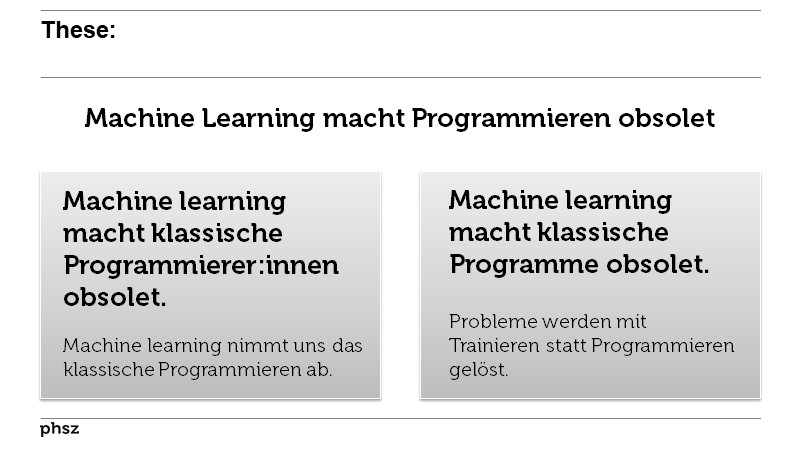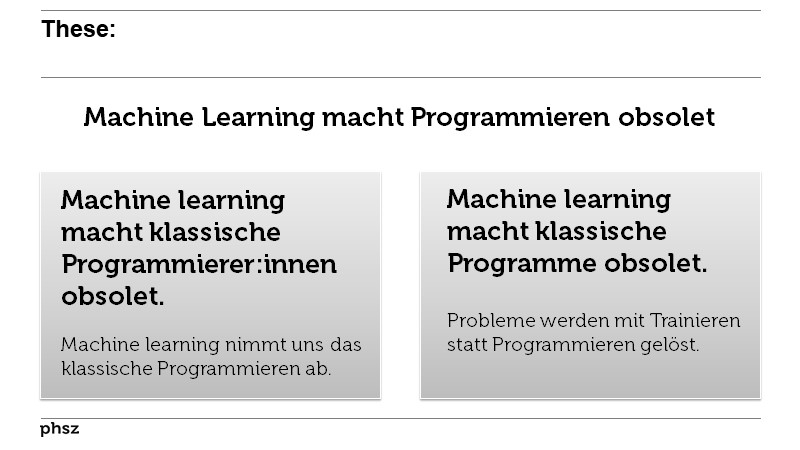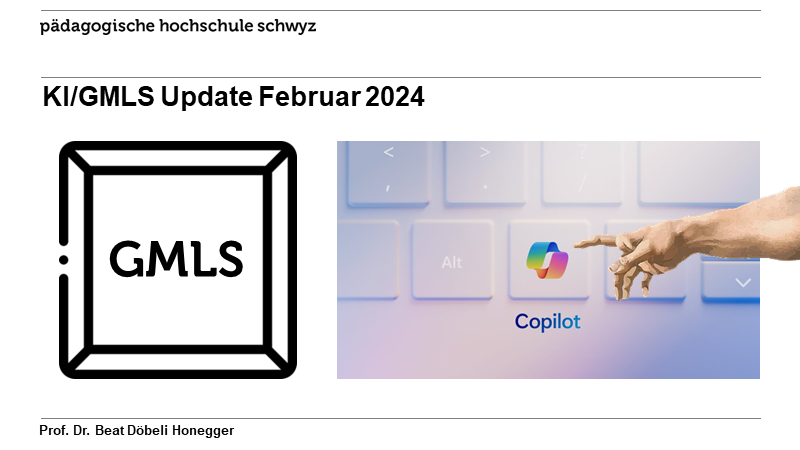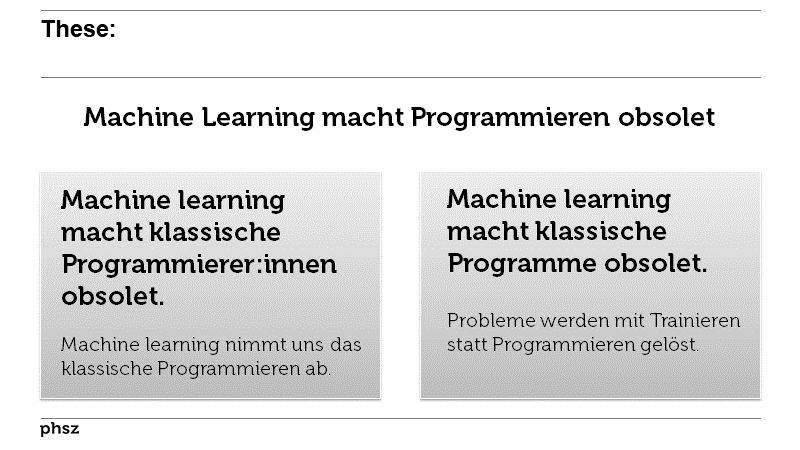Machine Learning macht Programmierkenntnisse obsolet |  |
 BiblioMap
BiblioMap 
 Bemerkungen
Bemerkungen
Programmierer, die Teile ihrer Arbeit an
die KI outsourcen, scheinen also den
Blick für das große Ganze zu verlieren.
das liegt womöglich daran, dass die Systeme
selbst diesen Blick nicht haben.
Von Piotr Heller im Text Wenn Computer Software schreiben (2023)  Programmierer sind gerade extrem gefragt. Nur weil ChatGPT auch richtig guten Code schreiben kann, erwarte ich nicht, dass es in fünf Jahren bloß noch halb so viele Programmierer in den USA gibt. Denn ihr Bedarf steigt, und sie werden produktiver sein.
Programmierer sind gerade extrem gefragt. Nur weil ChatGPT auch richtig guten Code schreiben kann, erwarte ich nicht, dass es in fünf Jahren bloß noch halb so viele Programmierer in den USA gibt. Denn ihr Bedarf steigt, und sie werden produktiver sein. Klar, ein Programmierer, der bei gleicher Qualität nur halb so schnell ist wie ein anderer, hat ein Problem. Das war immer so. Wird ChatGPT ein Ersatz für Programmierer oder nur sein nächstes Werkzeug? Letzteres, würde ich sagen. Vorausgesetzt, sie lernen ständig dazu.
Klar, ein Programmierer, der bei gleicher Qualität nur halb so schnell ist wie ein anderer, hat ein Problem. Das war immer so. Wird ChatGPT ein Ersatz für Programmierer oder nur sein nächstes Werkzeug? Letzteres, würde ich sagen. Vorausgesetzt, sie lernen ständig dazu.In this new computer science — if we
even call it computer science at all — the
machines will be so powerful and already
know how to do so many things that the
field will look like less of an engineering
endeavor and more of an an educational
one; that is, how to best educate the machine, not unlike the science of how to
best educate children in school.
Von Matt Welsh im Text The End of Programming (2023)  I am skeptical that the ability of generative AI systems to produce computer programs will eliminate the value
of people learning to code—just as I am skeptical that the ability of ChatGPT to generate essays will eliminate
the value of people learning to write. But I do think that generative AI technologies could significantly change
how young people program computers.
I am skeptical that the ability of generative AI systems to produce computer programs will eliminate the value
of people learning to code—just as I am skeptical that the ability of ChatGPT to generate essays will eliminate
the value of people learning to write. But I do think that generative AI technologies could significantly change
how young people program computers. Many people are now wondering if generative AI technologies could end the need for people to learn to code.
After all, part of the promise of generative AI is that people will be able to use everyday language to interact
with computers. Why learn to write code in a programming language when you can simply engage in
conversation with the computer, telling it what you want it to do?
Many people are now wondering if generative AI technologies could end the need for people to learn to code.
After all, part of the promise of generative AI is that people will be able to use everyday language to interact
with computers. Why learn to write code in a programming language when you can simply engage in
conversation with the computer, telling it what you want it to do? Faktisch werden gute Software-Entwickler*innen gebraucht und hervorragend bezahlt. Mit GPT-4 teilt sich die Arbeit an Software aber noch stärker auf: Ein großer Teil der bisherigen Softwareherstellung, manchmal als »Codeschrubben« verballhornt, hat wenig mit großartigen Fähigkeiten oder Ideen zu tun und viel mit schnöder, aber zeitintensiver Umsetzung. Dieser Part kann jetzt ziemlich weitgehend automatisiert werden.
Faktisch werden gute Software-Entwickler*innen gebraucht und hervorragend bezahlt. Mit GPT-4 teilt sich die Arbeit an Software aber noch stärker auf: Ein großer Teil der bisherigen Softwareherstellung, manchmal als »Codeschrubben« verballhornt, hat wenig mit großartigen Fähigkeiten oder Ideen zu tun und viel mit schnöder, aber zeitintensiver Umsetzung. Dieser Part kann jetzt ziemlich weitgehend automatisiert werden.At the recent World Government Summit in Dubai, Nvidia CEO Jensen Huang made a counterintuitive break with what he thinks is a long tradition of tech CEOs advising youngsters to learn how to code. Huang argued that, even at this early stage of the artificial intelligence (AI) revolution, programming is no longer a vital skill. With coding taken care of by AI, humans can instead focus on more valuable expertise like biology, education, manufacturing, or farming, reasoned the Nvidia head.
Von Mark Tyson im Text Jensen Huang says kids shouldn't learn to code — they should leave it up to AI (2024) Programming will be obsolete. I believe
the conventional idea of “writing a
program” is headed for extinction, and
indeed, for all but very specialized applications,
most software, as we know it, will
be replaced by AI systems that are trained
rather than programmed. In situations
where one needs a “simple” program
(after all, not everything should require a
model of hundreds of billions of parameters
running on a cluster of GPUs), those
programs will, themselves, be generated
by an AI rather than coded by hand.
Von Matt Welsh im Text The End of Programming (2023) The reality is that while writing code is hard, the harder part for students (and really anyone) is understanding how it executes and then making decisions about what it should do differently. Program comprehension is what makes APIs hard to use (because they intentionally hide what they do, capturing behavior only through poorly written natural language). It’s what makes programming languages hard to use (because debugging tools are so poor slowing down enough to teach). It’s what makes large software systems hard to change and evolve (because of the sheer amount of code to understand). LLMs do nothing to make this comprehension or decision making easier.
Von Amy J. Ko im Text Large language models will change programming... a little (2023) First, LLMs will reduce complexity. And for somewhat obvious reasons: the world of open source shares a massive collection of solutions to common messy problems in programming languages and API usage, and so for the past two decades of the internet, the problem hasn’t been so much about solving those problems, but finding the solutions that someone has already written down. This was what enabled the explosive popularity of Stack Overflow and the decades of research on code search. LLM-driven code synthesis will be, and already are to an extent, better search engines for finding those solutions (albeit without giving anyone credit). This future will be a slightly better one for programmers, just like better documentation and better search has always been. It will make it easier to find the useful design patterns amidst an infinite space of wrong answers.
Von Amy J. Ko im Text Large language models will change programming... a little (2023) Im professionellen Selbstverständnis wird es zunehmend wichtiger, dass man die von ChatGPT erzeugten Inhalte kontrollieren, adaptieren und kontextualisieren kann. Das betrifft sowohl die Text- wie auch die Code-Erzeugung. In der Informatik muss man beispielsweise überprüfen, ob die generierte Codezeile die gewünschte Funktion erfüllt und ob sie in die bestehende Programmierumgebung hineinpasst. Ist dieser Vorschlag tatsächlich das, was ich brauche? Ist diese Lösung effizient? Kann man Teile davon automatisieren, indem man systematisch Tests fährt? Die Aufgabe von Programmiererinnen und Programmierern wird sich also verschieben: Die Softwareentwicklung „from scratch“ verliert an Bedeutung – umso wichtiger wird hingegen die Fähigkeit der kritischen Beurteilung von Code. Und wie gesagt: Das betrifft nicht nur die Informatik. Wir müssen alle lernen, kritischer zu lesen.
Von Martin Volk im Text So verändert ChatGPT die Bildungs- und Berufswelt (2023)  Baxter ist ein dem menschlichen Oberkörper nachempfundener Roboter mit zwei Armen und einem Bildschirm als »Kopf«. Darauf kann ein Gesicht angezeigt werden, das dorthin blickt, wo der Roboter demnächst etwas tun wird und das Traurigkeit oder Verwirrtheit ausdrückt, wenn dem Roboter etwas nicht gelingen will. Das Revolutionäre ist jedoch, dass Baxter sich programmieren lässt, indem man seine Arme greift und ihm damit vormacht, was er zu tun hat. Nach etwa einer halben Stunde Training hat er verstanden, was er zu tun hat, und kann nun beispielsweise selbstständig Objekte in Kisten verpacken oder Nägel an einer bestimmten Stelle einschlagen. Dieses programming by demonstration ermöglicht es auch Laien, den Roboter zu programmieren – teure und rare Programmierer werden damit überflüssig. Ähnlich wie der Computer ist er damit kein Werkzeug nur für einen bestimmten Zweck, sondern ein lernfähiger Universalroboter.
Baxter ist ein dem menschlichen Oberkörper nachempfundener Roboter mit zwei Armen und einem Bildschirm als »Kopf«. Darauf kann ein Gesicht angezeigt werden, das dorthin blickt, wo der Roboter demnächst etwas tun wird und das Traurigkeit oder Verwirrtheit ausdrückt, wenn dem Roboter etwas nicht gelingen will. Das Revolutionäre ist jedoch, dass Baxter sich programmieren lässt, indem man seine Arme greift und ihm damit vormacht, was er zu tun hat. Nach etwa einer halben Stunde Training hat er verstanden, was er zu tun hat, und kann nun beispielsweise selbstständig Objekte in Kisten verpacken oder Nägel an einer bestimmten Stelle einschlagen. Dieses programming by demonstration ermöglicht es auch Laien, den Roboter zu programmieren – teure und rare Programmierer werden damit überflüssig. Ähnlich wie der Computer ist er damit kein Werkzeug nur für einen bestimmten Zweck, sondern ein lernfähiger Universalroboter. 3 Vorträge von Beat mit Bezug
3 Vorträge von Beat mit Bezug
- ChatGPT und die (informatische (Schul-))Bildung
Ausschuss "Bildung, Fachkräfte und Diversität" von digitalswitzerland, 07.03.2023

- Schule, Digitalisierung und die Rolle der Informatik
Landesinformatiktag Hamburg und Schleswig-Holstein, 25.03.2023

- Antworten auf Knopfdruck?
Mitarbeitendenklausur der PHSZ, 19.02.2024

 Zitationsgraph
Zitationsgraph
 Zeitleiste
Zeitleiste
 12 Erwähnungen
12 Erwähnungen 
- Mehr als 0 und 1 - Schule in einer digitalisierten Welt (Beat Döbeli Honegger) (2016)


- The End of Programming (Matt Welsh) (2023)


- Wenn Computer Software schreiben (Piotr Heller) (2023)


- The Premature Obituary of Programming - Why deep learning will not replace programming (Daniel M. Yellin) (2023)


- So verändert ChatGPT die Bildungs- und Berufswelt (Martin Volk, Joël Orizet) (2023)


- Large language models will change programming... a little (Amy J. Ko) (2023)


- Die neue Weltmacht - Wie ChatGPT und Co. unser Leben verändern (Titelthema Spiegel 10/2023) (2023)

- «Jobs zu schützen wäre ökonomischer Wahnsinn» (Andrew McAfee, Simon Book, Patrick Beuth)

- «Jobs zu schützen wäre ökonomischer Wahnsinn» (Andrew McAfee, Simon Book, Patrick Beuth)
- «ChatGPT: What is your IQ?» (Jürg Gutknecht) (2023)


- Eines der mächtigsten Instrumente der Menschheitsgeschichte (Sascha Lobo) (2023)


- The Coming Wave - Technology, Power, and the Twenty-first Century's Greatest Dilemma (Mustafa Suleyman, Michael Bhaskar) (2023)


- 4. Die Technologie der Intelligenz


- 4. Die Technologie der Intelligenz
- Jensen Huang says kids shouldn't learn to code — they should leave it up to AI (Mark Tyson) (2024)



- Generative AI and Creative Learning - Concerns, Opportunities, and Choices (Mitchel Resnick) (2024)















 Biblionetz-History
Biblionetz-History